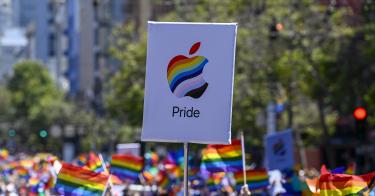LGBTQ advocates have long allied themselves with diversity, equity and inclusion groups. Yet DEI’s legal troubles are causing some corporate sponsors to end their support for Pride activities.
Soon, Pride advocates may have legal problems of their own. That’s bad for Pride organizers, but it’s good for parents because rulings could spell out protections for parents and children from explicit sexual material in schools.
An April survey of corporate executives found that 39% of respondents “plan to reduce Pride-related engagement in 2025,” with 61% of these business leaders citing “pressure” from the White House as the primary reason for dropping support.
Some Pride organizations are reeling: Businesses such as Mastercard, Pepsi, Comcast and more did not contribute to Pride events—in fact, San Francisco’s Pride organizations saw fundraising fall by $200,000. New York City’s Pride fundraising dropped by 20%, while Salt Lake City’s Pride fundraising is down by nearly half a million dollars.
Companies were more interested in supporting Pride events and their DEI partners when federal officials allowed DEI offices in corporations and on university campuses to skirt civil rights laws.
>>> Gender Ideology Threatens Religious Freedom and Endangers Children
According to Forbes, corporate fundraising for DEI “peaked” between 2016 and 2022, which happened to cover much of President Biden’s administration. That administration did not call companies, universities and other organizations to account for DEI activities that may have violated the Civil Rights Act, such as racial favoritism in hiring.
But things have changed: In 2023, the U.S. Supreme Court ruled against racial preferences—a centerpiece of DEI programming—in college admissions and beyond. State lawmakers continue to adopt proposals that prohibit the use of taxpayer spending on DEI offices, with Tennessee’s prohibition providing a recent example. The new White House is enforcing the civil rights laws that DEI offices would rather skirt.
As a result, fewer businesses are finding room in their budgets for DEI and related efforts such as Pride parades. In the fall, Heritage Foundation research found that more than a dozen Fortune 500 companies had stepped back from DEI, including Walmart and Microsoft. More corporations have done the same since.
Meanwhile, Robby Starbuck, now a visiting fellow at The Heritage Foundation, has exposed corporations’ DEI activities on social media, precipitating a host of C-suite decisions to drop DEI programs.
DEI as a movement is on the wane in the education and business sectors.
This week, the Florida University Board of Governors rejected a presidential prospect for the state’s flagship university because of his prior support for DEI. Target, the retail giant, had made headlines for the company’s support of DEI and Pride causes. Now, however, the company has tempered its advocacy so much that Pride advocates in Minneapolis rejected a Target donation to Pride month activities.
DEI-favored policies, including the use of racial preferences in human resource policies and school admissions, likely violate civil rights statutes—giving corporations plenty of reasons to step back from support.
Yet DEI programs and Pride organizations have overlapping ideologies that, while not always illegal, are unpopular with voters, especially parents.
>>> To Foster True Academic Freedom, We Must Enforce Anti-DEI Laws
For example, DEI offices support drag shows, as do, unsurprisingly, Pride organizations. Stories of children being exposed to drag shows—and sometimes even of public schools hosting drag shows—have shocked parents.
In Chicago this week, drag show “story time” advocates faced stiff opposition from parents who did not want toddlers—children barely old enough to walk—exposed to graphic sexual displays at a public library.
In response, state lawmakers have introduced proposals that keep drag shows away from school grounds. But state lawmakers should also consider proposals that require school personnel to inform parents of such programming and give families the opportunity to opt out.
Now, the U.S. Supreme Court is considering a case in which parents in Montgomery County, Maryland, were denied the opportunity to remove their children from lessons involving sexually themed LGBTQ books. If the court rules in the parents’ favor and Pride advocates insist on pushing sexually charged material in schools, businesses will gain yet another reason not to fund Pride month activities.
Pride’s allegiance to DEI has pushed corporate sponsors away. The movement’s own inability or unwillingness to shield children from sexually explicit content continues to alienate parents. The list of reasons—cultural, legal and political—for businesses to distance themselves from DEI and Pride is only growing.
This piece originally appeared in The Washington Times




